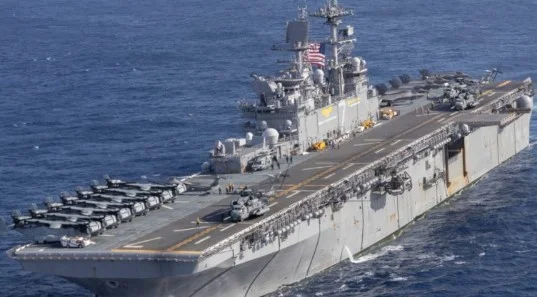 |
| Falujjah, The Name of the US Navy's Amphibious Assault Ship Taken From an Iraqi City |
International Military - The next United States Navy (US Navy) amphibious assault ship will be named after a city in Iraq, Fallujah. The city witnessed some of the bloodiest fighting of the Iraq war, as US Marines fought Al-Qaeda extremists in deadly house-to-house battles.
US Navy Secretary Carlos Del Toro said the USS Fallujah would commemorate what became known as the "First and Second Battles of Fallujah". This follows the tradition of naming assault ships after Marine Corps battles or other early sailing ships and aircraft carriers.
"It is an honor to remember the Marines, soldiers and coalition partners who fought so bravely and those who sacrificed their lives during both battles in Fallujah," Del Toro said in a statement, as quoted by AP, Tuesday (29/12/2022) ).
Located about 65 kilometers from Baghdad, the city became a base for the Sunni anti-government rebellion after the 2003 US-led invasion overthrew Saddam Hussein. Al-Qaeda militants, who have risen against the Shia-dominated government in Baghdad, fought two bloody skirmishes with US troops in Fallujah in 2004 that killed more than 100 Americans and injured more than 1,000.
The first battle of Fallujah was sparked by increasing violence in the city, including the deaths of five US troops by roadside bombs, and four security contractors working for Blackwater USA. The contractors were killed and their bodies burned. Two bodies were hung from a bridge, and photographs of the massacre were circulated in the media.
In response, the Marines fought for days to take control of the town, and at a turning point, a Marine vehicle was hit by a rocket-propelled grenade fired from the mosque, wounding five Marines. US troops converged on the mosque and eventually fired Hellfire missiles at the base of its minarets, and F-16 fighter jets dropped 500-pound bombs, killing dozens of people and igniting anti-American sentiment. However, within a month, US troops withdrew from Fallujah and handed control to local Iraqi security forces.
The second battle took place in November 2004, and was a major air and ground assault by US forces, along with British and Iraqi troops, to take control of the city. Dozens of Americans and hundreds of militants were killed and large parts of the city were damaged and destroyed. An Iraqi journalist in town at the time said, “People are afraid to even look out the window because of the snipers. Americans shoot anything that moves.”
Gen. Richard Myers, now retired but chairman of the US Joint Chiefs of Staff during that time, said that "hundreds and hundreds of insurgents" had been killed and captured. He said the Fallujah offensive was "very, very successful" but would not finish the insurgency. "If anyone thought that Fallujah would be the end of the insurgency in Iraq, that was never our goal, our intention, and even our hope," he said.
A decade later, the city once again became a hotbed of deadly insurgency as the Daesh (ISIS) group seized control, starting its dramatic offensive across Iraq. It took nearly two years, and an influx of US troops back into the country to rebuild Iraq's military, to recapture the city in a critical step to expel ISIS from major Iraqi cities.
